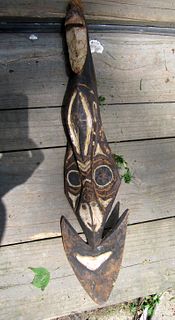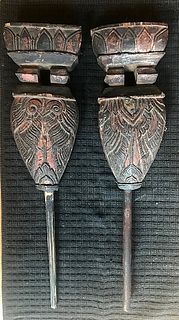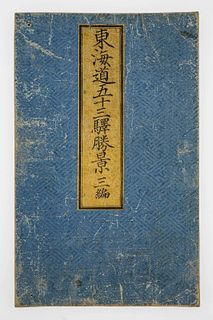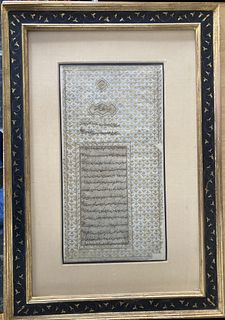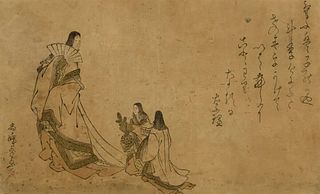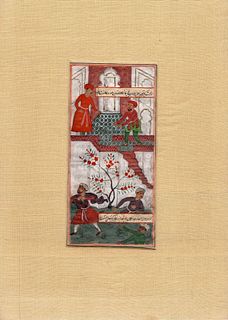Pair of Chinese Ming Wooden Lohan Figures
Lot 2
About Seller
Artemis Fine Arts
686 S Taylor Ave, Ste 106
Louisville, CO 80027
United States
Selling antiquities, ancient and ethnographic art online since 1993, Artemis Gallery specializes in Classical Antiquities (Egyptian, Greek, Roman, Near Eastern), Asian, Pre-Columbian, African / Tribal / Oceanographic art. Our extensive inventory includes pottery, stone, metal, wood, glass and textil...Read more
Categories
Estimate:
$14,000 - $21,000
Absentee vs Live bid
Two ways to bid:
- Leave a max absentee bid and the platform will bid on your behalf up to your maximum bid during the live auction.
- Bid live during the auction and your bids will be submitted real-time to the auctioneer.
Bid Increments
| Price | Bid Increment |
|---|---|
| $1 | $25 |
About Auction
By Artemis Fine Arts
May 1, 2025
Set Reminder
2025-05-01 10:00:00
2025-05-01 10:00:00
America/New_York
Bidsquare
Bidsquare : Fine Antiquities, Asian, Ethno, Fine Art
https://www.bidsquare.com/auctions/artemis-gallery/fine-antiquities-asian-ethno-fine-art-19334
Showcasing an extraordinary array of artifacts and art, including Egyptian, Greek, Roman, Etruscan, Near Eastern, Asian, Pre-Columbian, Native American, Tribal, Oceanic, Spanish Colonial treasures, fossils, fine and visual arts, and more! All ancient items are ethically sourced and legally available for sale. Enjoy the ease of in-house shipping for a seamless experience! Artemis Fine Arts info@artemisfinearts.com
Showcasing an extraordinary array of artifacts and art, including Egyptian, Greek, Roman, Etruscan, Near Eastern, Asian, Pre-Columbian, Native American, Tribal, Oceanic, Spanish Colonial treasures, fossils, fine and visual arts, and more! All ancient items are ethically sourced and legally available for sale. Enjoy the ease of in-house shipping for a seamless experience! Artemis Fine Arts info@artemisfinearts.com
- Lot Description
East Asia, China, Ming Dynasty, ca. 1368 to 1644 CE. From the mists of the Ming Dynasty arose these two wooden Lohan figures, silent witnesses to centuries past. Fashioned, it seems, by a singular hand, their forms echo each other, whispering tales of shared sanctuary within the hushed halls of a temple long since faded into memory. One, clean-shaven and serene, his hands clasped in a gesture of profound stillness, remains an enigma, perhaps a guardian of wisdom amongst his enlightened brethren. Beside him sits a Lohan bearing the venerable mark of time - a bald pate crowned by a flowing beard, the very visage that history often lends to Bodhidharma, the Indian sage who carried the seeds of Chan across mountains and rivers to take root in Chinese soil. Each figure bears a cavity in its verso, a silent receptacle intended for the placement of prayers and offerings, further underscoring their sacred purpose. Size (both similar): 9.75" L x 12.75" W x 28.25" H (24.8 cm x 32.4 cm x 71.8 cm)
Together, these two souls, imbued with the spirit of devotion and the patina of ages, evoke a sense of ancient sanctity, their stillness a poignant echo of the vibrant faith that once breathed life into their carved forms.
Lohans, also known as Arhats in Sanskrit, are revered figures in Buddhism, particularly within the Mahayana tradition prevalent in China. They are enlightened disciples of the Buddha who have achieved Nirvana, the liberation from the cycle of rebirth, yet choose to remain in the world to protect the Buddhist teachings and guide others on the path to enlightenment. Often depicted in groups of sixteen, eighteen, or even five hundred, Lohans are characterized by their diverse personalities and unique attributes, reflecting the varied paths to enlightenment and the compassionate commitment to aiding all sentient beings. They embody wisdom, perseverance, and the transcendence of worldly desires, serving as powerful symbols of spiritual attainment and the enduring presence of the Buddha's teachings in the world.
Bodhidharma, a pivotal figure in the history of Chan (Zen) Buddhism, is often revered as the First Patriarch of Chan in China. Traditionally believed to be an Indian prince turned monk, he journeyed to China in the 5th or 6th century CE, bringing with him a direct, meditative approach to Buddhist practice. Legend recounts his intense dedication, including nine years of silent meditation facing a wall at the Shaolin Monastery. Bodhidharma's teachings emphasized direct experience and the inherent Buddha-nature within all beings, rather than reliance on scriptures or rituals. He is often depicted with a stern countenance, a full beard, and sometimes carrying a staff or wearing simple robes, embodying the austere and transformative essence of early Chan Buddhism, which profoundly shaped the spiritual landscape of East Asia.
Provenance: private Los Angeles, California, USA collection, acquired from 1990 to 2005
All items legal to buy/sell under U.S. Statute covering cultural patrimony Code 2600, CHAPTER 14, and are guaranteed to be as described or your money back.
A Certificate of Authenticity will accompany all winning bids.
We ship worldwide and handle all shipping in-house for your convenience.
SHIPPING EXCEPTIONS: Due to customs clearance issues, we are unable to ship to Germany, Switzerland and Australia. If you live in Germany, Switzerland or Australia, you will need to provide an alternate shipping destination, or we will not be able to complete your purchase. In addition, please note that we are unable to ship ancient items back to the original country of origin (Egyptian to Egypt, Greek to Greece, etc.)
PAYMENT EXCEPTION: Unless a known customer of Artemis, payment for all gold / precious metal / gem lots must be made via Bank Wire Transfer or Certified Bank Check/Money Order, no exceptions.
#192627Missing covers to back cavities. Both have some stable fissures to wood plus chipping, nicks, and abrasions as shown. Fading and Losses to pigment. Otherwise, nice presentation with good detail and rich patina to wood.Condition
- Shipping Info
-
All shipping is handled in-house for your convenience. Your invoice from Artemis Gallery will include shipping calculation instructions. If in doubt, please inquire BEFORE bidding for estimated shipping costs for individual items.
-
- Buyer's Premium



 EUR
EUR CAD
CAD AUD
AUD GBP
GBP MXN
MXN HKD
HKD CNY
CNY MYR
MYR SEK
SEK SGD
SGD CHF
CHF THB
THB






